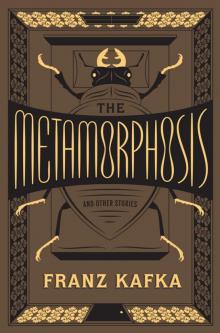- Home
- Franz Kafka
The Metamorphosis and Other Stories Page 4
The Metamorphosis and Other Stories Read online
Page 4
“Gregor,” said his father then from the room to the left, “the chief clerk has come and is inquiring about why you didn’t depart with the early train. We don’t know what we should tell him. For that matter, he would like to speak with you in person. So please open the door. He will be good enough to excuse the disorder in your room.” “Good morning, Herr Samsa,” the chief clerk interjected amiably. “He’s not feeling well,” said his mother to the chief clerk while his father was still speaking at the door, “he’s not feeling well, believe me, sir. How else would Gregor miss his train! The boy has nothing in mind other than business, after all. It almost irritates me that he never goes out in the evenings; now he has been in town for eight days, but has spent every evening at home. He sits there with us at the table and reads the newspaper or studies train schedules. It’s distraction enough for him to busy himself with fretwork. He cut a little frame, for example, over the course of two, three evenings; you’ll be amazed how pretty it is; it is hanging in his room; you’ll see it in just a moment, when Gregor opens the door. I am grateful, by the way, that you are here, sir; we alone would not have been able to convince Gregor to open the door; he’s so stubborn; and most certainly not feeling well, although he denied it this morning.” “I’ll be right there,” said Gregor slowly and deliberately and didn’t stir so as not to miss one word of the conversations. “Nor can I, dear lady, think of any other explanation,” said the chief clerk. “Hopefully it is nothing serious. While I must say, on the other hand, that we businessmen—unfortunately or fortunately, as you will—must very often simply overcome slight illnesses for the sake of business concerns. “So can the chief clerk come into your room?” asked his impatient father and knocked again on the door. “No,” said Gregor. An awkward silence entered the room to the left; in the room to the right his sister began to sob.
Why did his sister not join the others? She must have just gotten out of bed and had not even begun to get dressed. And why was she crying? Because he hadn’t gotten up and wouldn’t let the chief clerk in, because he was in danger of losing his position, and because then his boss would pursue their parents with the old demands again? But these were surely unnecessary worries for the time being. Gregor was still here and hadn’t the slightest intention of leaving his family. At the moment, he seemed to be lying on the carpet, and no one who knew of his condition would have seriously demanded of him that he let the chief clerk in. But Gregor could not really be immediately dismissed on account of this little discourtesy, for which a suitable excuse could easily be found later. And it seemed to Gregor that it would be far more sensible for them to leave him in peace now, instead of bothering him with crying and pleading. It was the uncertainty, however, that distressed the others and excused their behavior.
“Herr Samsa,” called the chief clerk now with a raised voice, “what is the matter? You’re barricading yourself in your room, answering only with yes and no, giving your parents grave, unnecessary cause for concern, and neglecting—this mentioned only incidentally—your business obligations in a manner that is actually outrageous. I am speaking here in the name of your parents and your boss and ask you quite seriously for an immediate, clear explanation. I’m astonished, astonished. I thought I knew you to be a quiet, sensible person, and now you seem to want to suddenly start showing off your strange whims. Although the director implied a possible explanation for your absence this morning—it concerned the task of cash collection, with which you have been entrusted as of recently—I almost pledged my word of honor that this explanation could not apply. But now I see your incomprehensible stubbornness here and am losing all desire to advocate for you in the slightest. And your position is certainly not the most stable. I originally had the intention of telling you this in confidence, but as you are letting me waste my time here uselessly, I don’t know why your parents should not hear it as well. So your recent performance has been very unsatisfactory; admittedly, it is not the season for doing particularly good business, this we recognize; but a season for doing no business at all doesn’t exist, Herr Samsa, cannot exist.”
“But sir,” cried Gregor frantically, forgetting everything else in his excitement, “I’ll open the door immediately, this very moment. A slight illness, a bout of dizziness, prevented me from getting up. I am still lying in bed. But now I am feeling quite fresh again. I am now getting out of bed. Just a moment’s patience! It’s not yet going so well as I thought. But I am already feeling quite well again. Incredible, how a person can be overwhelmed by such a thing! Only yesterday evening I was feeling quite fine. My parents know for sure. Or rather, yesterday evening I already had a little premonition. They must have noticed it. Why didn’t I notify the office! But one always thinks that one can overcome the illness without staying home. Sir! Spare my parents! There is no reason for all the accusations that you are now making; no one has mentioned a single word about it to me. Perhaps you haven’t read the last orders that I sent. I’ll be traveling with the eight o’clock train, by the way, the few hours rest have given me strength. Don’t let me keep you, sir; I will be in the office myself soon, and please be good enough to tell them that, and give my regards to our esteemed director!”
And as Gregor emitted all this hastily, hardly knowing what he was saying, he had easily drawn himself closer to the chest, probably due to the practice he had already had in bed, and was now attempting to straighten himself up against it. He truly did want to open the door, truly did want to let himself be seen and to speak to the chief clerk; he was eager to hear what the others, who were demanding him so eagerly, would say at the sight of him. If they were frightened, then Gregor would no longer bear responsibility and could be calm. If they accepted everything calmly, however, then he would also have no reason to fret and could, if he hurried, actually be at the train station at eight o’clock. At first he slid off the smooth chest several times, but finally gave himself one last swing and stood there upright; he no longer paid any attention to the pain in his lower abdomen, however much it burned. Now he let himself fall against the backrest of a nearby chair, the edges of which he held onto with his little legs. In doing so, he had also gained control of himself and fell silent, for now he was able to hear the chief clerk.
“Did you understand a single word?” the chief clerk asked his parents. “He’s not making fools of us, is he?” “For God’s sake,” cried his mother, already in tears, “maybe he is seriously ill, and we are agonizing him. Grete! Grete!” she then screamed. “Mother?” called his sister from the other side. They were communicating through Gregor’s room. “You must go to the doctor this instant. Gregor is ill. Rush for the doctor. Did you hear Gregor speaking just now?” “That was an animal’s voice,” said the chief clerk, in a noticeably quiet voice, compared to his mother’s screaming. “Anna! Anna!” called his father through the hallway into the kitchen, clapping his hands, “Fetch a locksmith at once!” And the two girls were already running with rustling skirts through the hallway—how had his sister gotten dressed so quickly?—and tearing open the apartment door. One didn’t even hear the door slamming shut; they must have left it open, as is customary in apartments in which a great misfortune has taken place.
Gregor had become much calmer, however. So his words were no longer understandable, although they had seemed to be clear enough, clearer than before, maybe as a result of the adaptation of his ears. But after all they now believed that something was not quite right with him and were prepared to help him. The assurance and certainty with which the first arrangements had been made had done him good. He felt included again in the human sphere and hoped for great and surprising achievements from both men, the doctor and the locksmith, without entirely distinguishing among them. In order for his voice to become as clear as possible for the imminent crucial consultations, he cleared his throat a little, making an effort, however, to mute the sound, for it was possible that this sound was also already different from the sound of a human cough, which he no longer trusted himself to
decide. In the next room, meanwhile, it had become entirely silent. Perhaps his parents were sitting with the chief clerk at the table and whispering, perhaps they were all leaning against the door and listening.
Gregor pushed himself slowly toward the door with the armchair, let go of it there, threw himself toward the door, held himself upright against it—the pads on his little legs were a bit sticky—and rested there for a moment to recover from the strain. But then he set about turning the key in the lock with his mouth. Unfortunately, it seemed that he lacked proper teeth,—what was he to grasp the key with?—but his jaws, on the other hand, were certainly very strong; and with their help, he actually got the key moving and paid no attention to the fact that he was undoubtedly causing himself some kind of damage, for a brown fluid came out of his mouth, ran over the key, and dripped onto the floor. “Listen,” said the chief clerk in the next room, “he is turning the key.” That was a great encouragement for Gregor; but they all should have called out to him, including his father and mother: “Go on, Gregor!” they should have called, “Keep at it, keep at the lock!” And, imagining that everyone was following his efforts with excitement, he bit senselessly into the key with all the strength he could muster. In accordance with the progress of the turning of the key, he was dancing around the lock; he was now only holding himself upright by his mouth and hanging himself on the key, or pushing it down with the entire weight of his body, as necessary. The louder sound of the lock as it finally clicked back positively awoke Gregor. With a sigh of relief, he told himself: “So I didn’t need the locksmith after all,” and lay his head on the handle to open the door completely.
Because he had to open the door in this way, it was actually already open quite widely while he himself could not be seen. He first had to maneuver himself slowly around the one wing of the door, and to do so very carefully, if he didn’t want to fall clumsily onto his back just before his entrance into the room. He was still busy with this difficult movement and hadn’t had time to pay attention to anything else, when he already heard the chief clerk emitting a loud “Oh!” It sounded like the wind whistling, and now he could see him as well, how he, who was the one closest to the door, pressed his hand against his open mouth and retreated slowly, as though he were being expelled by some invisible, evenly lingering force. His mother—she was standing there, despite the chief clerk’s presence, with her hair still disheveled from the night and standing high on end—looked first with folded hands at his father, then took two steps toward Gregor and fell to her knees in the midst of the skirts that spread out around her, her face sunk to her breast, nowhere to be seen. His father clenched his fists with a hostile expression, as though he wanted to repel Gregor back into his room, but then looked around the living room uncertainly, shaded his eyes with his hands and cried, so that his mighty breast shook.
Gregor did not enter the room at all now, but leaned against the locked wing of the door so that only half of his body was visible, as well as his head tilted sideways above it, with which he was peering over at the others. It had become much brighter in the meantime; clear was the view of a section of the endless, gray-black house on the other side of the street—it was a hospital—with its regular windows starkly interrupting its façade; the rain was still falling, but only in large drops that were individually visible, and literally also being individually thrown down to the ground. An excessive number of breakfast dishes were still on the table, for his father regarded breakfast as the most important meal of the day, drawing it out for hours as he read various newspapers. On the wall directly opposite, there hung a photograph of Gregor during his time in the military, depicting him as a lieutenant, demanding, hand on his sword with a carefree smile, respect for his stance and uniform. The door to the hallway was open, and, because the front door was also open, one could see out to the forecourt and to the top of the downward- leading stairs.
“Well now,” said Gregor and was well aware that he was the only one who had maintained his calm, “I’ll get dressed right away, pack the collection together, and leave. Would you, would you like to let me leave? Well, chief clerk, you see that I am not obstinate and enjoy my work; the traveling is burdensome, but I couldn’t live without traveling. Where are you going, sir? To the office? Yes? Will you report everything faithfully? A person can be unable to work at the moment, but that is precisely the right time to recall his previous accomplishments and to consider that later, after the hindrance has been eliminated, he will certainly work more with more diligence and concentration. I am so indebted to the director, after all; this you know quite well. On the other hand, I am responsible for my parents and my sister. I’m in a quandary, but I’ll work my way out of it. But don’t make it harder for me than it already is. Put in a good word for me at the office! No love is lost on traveling salesmen, I know. One thinks, they earn a fortune and lead a great life. One simply has no particular reason to better think through this preconception. But you, sir, you have a better overview of the circumstances than the rest of the personnel, yes, between you and me, even a better overview than the director himself, who, in his capacity as employer, lets himself be misled to the slight disadvantage of his employees. You also know quite well that the traveler, who is outside the office for almost the entire year, easily becomes the victim of gossip, coincidence, and unfounded complaints, against which he cannot possibly defend himself, because he usually doesn’t even hear about them, and then, when he returns home exhausted from a journey, he comes to feel the terrible consequences of these causes that he can no longer decipher. Sir, please don’t leave without having said one word to me that shows me that you agree with me at least a little bit!”
But the chief clerk had already turned away at Gregor’s first words and only over his twitching shoulder did he look back at Gregor with his lips flung apart. And during Gregor’s speech, he hadn’t stood still for a moment, but moved away without taking his eyes off Gregor, against the door, but very gradually, as though it were secretly forbidden to leave the room. He was already in the hallway and, after the sudden movement, with which he had finally pulled his foot out of the living room, one could have believed he had just burned his sole. But in the hallway, he stretched his right hand far in front of him toward the stairs, as though nothing less than heavenly salvation were awaiting him there.
Gregor realized that there was no way he could let the chief clerk leave in this state of mind without putting his position in the company in grave danger. His parents didn’t understand all of this very well; they had developed the conviction over the long years that Gregor would be provided for by this company for his entire life, and besides, they were now so busy with their current concerns that all foresight had been lost. But Gregor possessed this foresight. The chief clerk must be held back, calmed, convinced, and finally won over; Gregor and his family’s future depended on it! If only his sister were here! She was clever; she had already wept when Gregor was still lying calmly on his back. And surely the chief clerk, that lady’s man, would have let her guide him; she would have closed the front door and talked him out of his shock in the hallway. But his sister was simply not there; Gregor himself had to act. And without thinking that he was not even familiar with his current abilities to move yet, also without thinking that his speech could possibly, indeed probably, not be understood again, he left the wing of the door; pushed himself through the opening; intended to approach the chief clerk, who was already clinging ridiculously to the railing in the forecourt with both hands; but fell down immediately, searching for support, with a little cry onto his many little legs. No sooner had this happened than, for the first time this morning, he felt physical comfort; his little legs had solid ground beneath them; they obeyed perfectly, as he observed with pleasure; they even strove to carry him away, wherever he wished; and already he believed that the final improvement of all suffering was imminent. But at that same moment, as he was lying there not far away from his mother, rocking with restrained movement, just acros
s from her on the floor, she who had seemed so entirely sunken within herself sprang up suddenly with arms stretched out widely and fingers spread, and screamed: “Help, for God’s sake, help!” tilting her head as though she wanted to see Gregor better, but ran, contradictory to this, back senselessly; she had forgotten that the table, which was still laid, was behind her; when she reached it, she sat down upon it hastily, as though in absence of mind; and seemed not to notice at all that a great stream of coffee was spilling from the large coffee pot that had been thrown over beside her onto the carpet.
“Mother, Mother,” said Gregor softly, and looked up at her. He had entirely forgotten the chief clerk for a moment; but at the sight of the flowing coffee, he could not resist snapping his jaws in the air several times. At that his mother screamed out again, fled from the table and fell into his father’s arms as he rushed toward her. But Gregor had no time for his parents now; the chief clerk was already on the stairs; with his chin on the railing, he was looking back for the last time. Gregor made a running start to be sure and catch up to him. The chief clerk must have sensed something, for he took a leap down several stairs and disappeared. “Aah!” he was still crying; it sounded throughout the entire stairwell. Unfortunately, the chief clerk’s escape appeared to have also entirely confused his father, who until now had been relatively calm, for instead of running after the chief clerk himself, or at least refraining from hindering Gregor in his pursuit, he grabbed with his right hand the chief clerk’s cane, which he had left behind on an armchair along with his hat and overcoat, took with his left hand a large newspaper from the table, and set about stamping his feet as he swung the cane and the newspaper in an attempt to drive Gregor back into his room. None of Gregor’s pleas helped; no pleas were understood, however submissively he turned his head; his father simply stamped all the more strongly with his feet. Despite the cool weather, his mother had flung open the window on the other side of the room, and as she leaned out, she pressed her face, far outside the window, into her hands. A strong draft had arisen between street and stairwell, the draperies flew open, the newspapers rustled on the table, and individual sheets blew across the floor. His father drove him back relentlessly, making hissing noises like a wildman. As Gregor hadn’t had any practice at all yet in walking backwards, it really went quite slowly. If only Gregor had been allowed to turn around he would have been in his room right away, but he was afraid of making his father impatient with the time-consuming rotation, and, after all, the cane in his father’s hand was threatening at any moment a deadly blow to his back or his head. But ultimately, Gregor had no choice, for he noticed with horror that when he went backwards, he didn’t even know how to keep going in the right direction; and so he began, with incessant fearful sideways glances toward his father, to turn himself around as quickly as possible, which was, in fact, only quite slowly. Perhaps his father noticed his good intent, for he didn’t disturb him in his efforts, and even directed his turning movements from a distance with the tip of his cane. If only his father would have stopped his unbearable hissing! It made Gregor lose his head entirely. He had almost turned around completely when he, constantly hearing this hissing, even made a mistake and turned himself back a ways. But when he had finally happily reached the doorway with his head, it became apparent that his body was too wide to simply pass through. Of course, it didn’t even remotely occur to his father in his current state to open the other wing of the door, for instance, to create a suitable passage for Gregor. His fixed idea was simply that Gregor must get into his room as quickly as possible. He never would have allowed the inconvenient preparations that Gregor needed to pull himself upright and perhaps pass through the door this way. On the contrary, he drove Gregor forwards, as though there were no obstacle, now with exceptional noise. Behind Gregor, it didn’t at all sound like merely the voice of his one father; now it was really no longer a joke, and Gregor thrust himself—come what may—into the doorway. The one side of his body rose. He lay aslant in the doorframe, his side was scraped raw, the white door covered with ugly stains. Soon he was stuck and would no longer have been able to move on his own. His little legs on the one side hung quivering up in the air while the others were being painfully pushed to the ground. Then his father gave him a powerful push from behind, which was truly liberating this time, and he flew, bleeding heavily, far into his room. The door was slammed shut with the cane, and then it was finally still.

 Diaries of Franz Kafka
Diaries of Franz Kafka Metamorphosis and Other Stories
Metamorphosis and Other Stories The Castle: A New Translation Based on the Restored Text
The Castle: A New Translation Based on the Restored Text The Complete Stories
The Complete Stories In the Penal Colony
In the Penal Colony The Trial
The Trial Amerika
Amerika The Burrow: Posthumously Published Short Fiction
The Burrow: Posthumously Published Short Fiction Sons
Sons Letters to Milena
Letters to Milena Investigations of a Dog: And Other Creatures
Investigations of a Dog: And Other Creatures Collected Stories
Collected Stories The Great Wall of China
The Great Wall of China The Burrow
The Burrow The Castle
The Castle The Meowmorphosis
The Meowmorphosis The Sons
The Sons The Lost Writings
The Lost Writings The Unhappiness of Being a Single Man
The Unhappiness of Being a Single Man Amerika: The Missing Person: A New Translation, Based on the Restored Text
Amerika: The Missing Person: A New Translation, Based on the Restored Text The Burrow: Posthumously Published Short Fiction (Penguin Modern Classics)
The Burrow: Posthumously Published Short Fiction (Penguin Modern Classics) The Diaries of Franz Kafka
The Diaries of Franz Kafka Investigations of a Dog
Investigations of a Dog The Metamorphosis and Other Stories
The Metamorphosis and Other Stories The Trial: A New Translation Based on the Restored Text
The Trial: A New Translation Based on the Restored Text